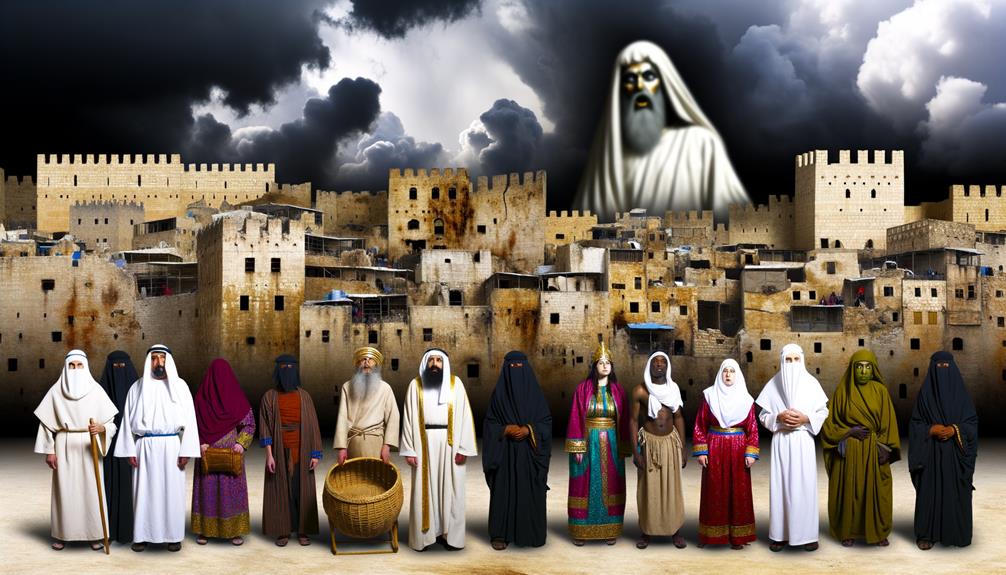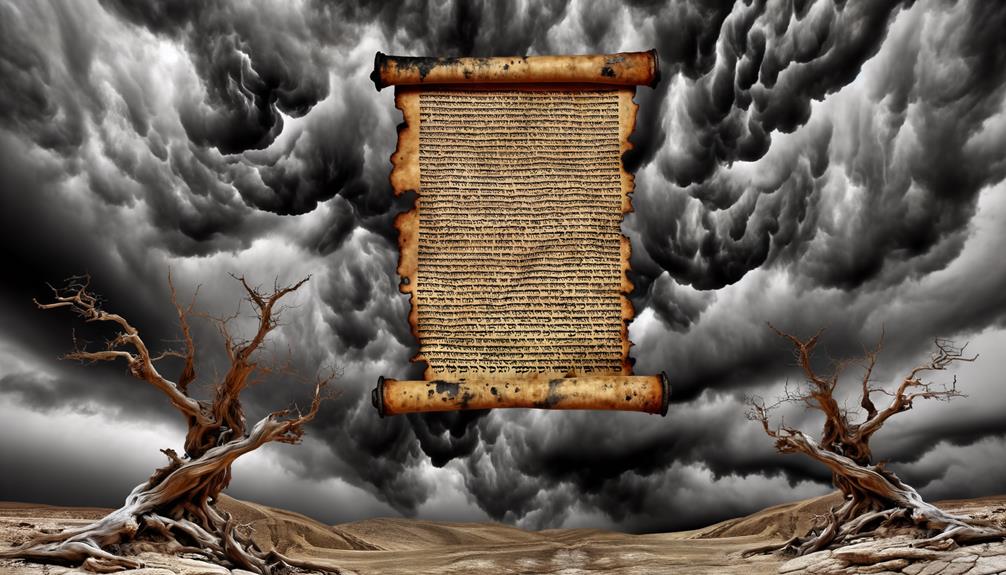Jeremiah 11:11 Bible Verse Meaning: Judgment and Warning
Jeremiah 11:11 captures the essence of divine retribution in response to Judah’s sustained idolatry and covenantal disobedience. Set against a backdrop of political and moral decline, this verse serves as a stark warning of the inevitable consequences of defying God’s covenant.
Theologically, it underscores the importance of covenant fidelity and the reality of divine judgment, reflecting God’s justice. Historically, it highlights the ramifications of rejecting prophetic warnings and turning away from divine authority.
This passage invites a deeper reflection on the intersections of divine justice and human responsibility, offering rich insights into ethical and theological imperatives.

Jeremiah 11:11 Meaning: A Warning of Judgment and Divine Justice
| Aspect | Details |
|---|---|
| Bible Verse Reference | Jeremiah 11:11, “Therefore this is what the Lord says: I will bring on them a disaster they cannot escape. Although they cry out to me, I will not listen to them.” |
| Context | Jeremiah, a prophet, warns Judah of impending judgment due to their idolatry and breaking of God’s covenant. |
| Literal Meaning | God declares consequences for Judah’s persistent rebellion and failure to repent. |
| Spiritual Significance | Highlights the seriousness of disobedience to God’s covenant and the inevitability of divine justice. |
| Key Themes | Judgment, consequences of sin, covenant faithfulness, and repentance. |
| Message for Believers | A call to reflect on one’s faithfulness to God, repent for disobedience, and trust in His mercy. |
| Modern Application | Serves as a reminder that ignoring God’s will leads to spiritual consequences, and repentance is crucial for restoration. |
Historical Context of Jeremiah 11:11

Situated within the turbulent period of Judah’s history, Jeremiah 11:11 emerges as a divine pronouncement during a time of rampant idolatry and covenantal disobedience.
The historical context is marked by pervasive political instability and spiritual infidelity among the people of Judah. The reign of King Josiah, known for his religious reforms, had come to an end, plunging the nation back into idolatrous practices.
Prophets like Jeremiah were tasked with calling the people back to the covenant established with Yahweh. However, their warnings largely went unheeded, intensifying divine judgment.
This period saw a series of geopolitical threats, particularly from Babylon, which further compounded the nation’s existential anxieties and moral decline, setting the stage for the severe admonitions found in Jeremiah 11:11.
Theological Significance

Theological significance in Jeremiah 11:11 centers on the divine retribution that underscores God’s justice and the inescapability of His judgment for covenantal breaches.
This verse reflects the theological principle that God is not only merciful but also righteous, holding His people accountable to their covenantal commitments. This duality emphasizes that while God’s mercy offers forgiveness and redemption, His righteousness ensures that justice prevails, reminding believers of the seriousness of their responsibilities. Understanding the ‘ezekiel 25:17 meaning and interpretation‘ reveals how these themes intertwine, illustrating that the fulfillment of God’s promises comes not only through grace but also through a steadfast commitment to His laws.
Jeremiah 11:11 serves as a grim reminder of the consequences of disobedience, emphasizing that divine patience has limits.
The verse also highlights the seriousness with which God regards His covenant, portraying divine retribution as a necessary response to persistent unfaithfulness.
In this instance, the verse invites reflection on the broader themes of covenant fidelity, human responsibility, and the nature of divine justice, urging believers to contemplate the gravity of their spiritual commitments.
Divine Judgment Explained

In Jeremiah 11:11, divine judgment manifests as an inevitable consequence of Israel’s persistent covenantal infidelity, underscoring the inexorable nature of God’s justice.
The verse states, ‘Therefore consequently says the Lord, ‘Behold, I am bringing disaster upon them that they cannot escape. Though they cry to me, I will not listen to them.” This pronouncement is a direct response to Israel’s repeated breaches of their covenantal obligations, highlighting the seriousness of divine retribution.
Theologically, it emphasizes that God’s justice is not arbitrary but rooted in the consistent and unwavering principles of His covenant with Israel.
Contextually, it serves as a stark reminder that divine patience has limits, and persistent disobedience inevitably leads to severe consequences.
Breaking God’s Covenant

Breaking God’s covenant entails a profound violation of the sacred agreement established between God and Israel, carrying significant theological and moral implications. This breach underscores a departure from divinely ordained laws and principles, leading to inevitable consequences.
Jeremiah 11:11, within its context, highlights the seriousness of such infractions, as it conveys God’s impending judgment on Israel for their disobedience. The breakdown of the covenant is marked by several key elements:
- Rejection of divine authority: Israel’s refusal to adhere to God’s commandments.
- Idolatry: Turning to other gods, violating the exclusive worship due to Yahweh.
- Moral decay: Engaging in practices contrary to God’s ethical standards.
- Prophetic warnings ignored: Dismissing the messages delivered by God’s prophets.
Jeremiah 11:11 in Popular Culture

Jeremiah 11:11, with its profound implications of divine retribution for Israel’s covenantal breaches, has found resonance in contemporary popular culture, often symbolizing inevitable judgment and moral consequences. This verse has significantly appeared in various media, most prominently in Jordan Peele’s 2019 film ‘Us,’ where it underscores themes of duality and societal reckoning. Its usage in modern narratives highlights the enduring power of biblical texts to convey profound ethical and existential messages.
| Media | Contextual Usage |
|---|---|
| Film | ‘Us’ by Jordan Peele |
| Literature | Apocalyptic themes |
| Television | Morality-based plots |
Such instances demonstrate the verse’s versatility in addressing modern concerns while retaining its theological gravitas.
Contemporary Interpretations

While the historical context of Jeremiah 11:11 addresses the covenantal disobedience of ancient Israel, contemporary interpretations often extend its themes to broader discussions of justice, accountability, and moral consequence in modern society.
Modern theologians and scholars argue that this verse’s relevance persists as it emphasizes the inevitable repercussions of moral failings on both individual and societal levels. It serves as a poignant reminder of the enduring principles of divine justice.
Key contemporary themes include:
- Social Injustice: Highlighting the consequences of societal inequities.
- Environmental Ethics: Addressing humanity’s stewardship of the earth.
- Personal Accountability: Encouraging individual moral responsibility.
- Collective Responsibility: Stressing communal obligations and repercussions.
These interpretations foster a deeper understanding of the verse’s timeless applicability.
Conclusion
Jeremiah 11:11 serves as a stark reminder of the consequences of forsaking divine covenants. The verse illustrates the severity of divine judgment and the inexorable nature of divine retribution.
Notably, even in contemporary culture, its ominous warning captivates and terrifies. Perhaps society finds a peculiar comfort in flirting with divine wrath, a proof of humanity’s insatiable curiosity for self-inflicted doom.
Consequently, Jeremiah 11:11 endures, a theological admonition wrapped in historical inevitability.






